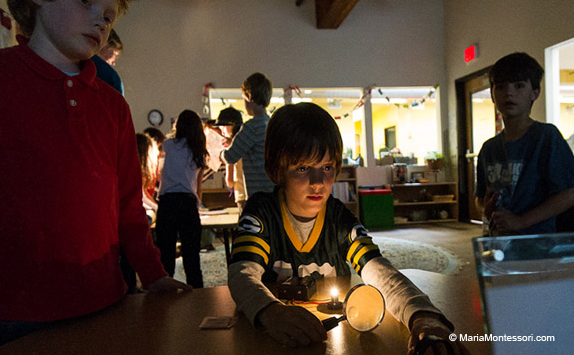
Margaret, a veteran elementary Montessori teacher, overheard a conversation between Steven and Paula, two children who were conducting a science experiment.
Steven lifted up a half-full test tube. “Hey, the solution isn’t turning blue the way it’s supposed to!”
Paula scratched her head. “What do you think we did wrong?”
Steven sighed and said, “I don’t know, let’s ask Ms. Margaret.”
With a dismissive gesture of the hand, Paula replied, “Nah, don’t ask her. She doesn’t know anything! I saw a chemistry book in the library, let’s look there.”
For Margaret, this was a moment of triumph, an indication that she was doing her job right. She obviously knows the answers to many of her students’ questions: why leaves turn red, why ice melts, and why fish have gills. She even knows why the children’s science experiment flopped. However, her standard response whenever a student asks a “why” question is: “I don’t know, but wouldn’t it be interesting to find out?”
The Montessori guide knows that she’s not serving her students’ best interests by providing the answers they seek. In the real world, we rarely have someone by our side answering all our questions. And even if we did, it wouldn’t do us much good in the long run; research shows that the most effective learning takes place through active participation, not passive absorption.

Think about what happens when you’re driving in an unfamiliar area of town. If the GPS is telling you what to do, you’ll probably arrive at your destination with little hassle, but you won’t remember how you got there! If instead, you use a map and other hands-on navigation tools, you might feel a little lost at first, but you’ll eventually find your way. More importantly, you’ll feel quite confident navigating the neighborhood the next time you visit.
The hands-on navigation tools that Montessori elementary teachers offer include Montessori materials, books, stories, diagrams, experiments, Going Out trips, and access to experts in all fields of study. The teacher provides an initial lesson using materials and storytelling. But the lesson is only a jumping-off point and is designed to generate more questions than answers.
Once the lesson ends, the “why’s” begin, and this is where the teacher happily replies: “I don’t know, but wouldn’t it be interesting to find out?”